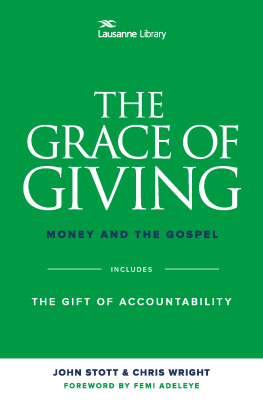The Grace of Giving: Money and the Gospel (eBook edition)
Hendrickson Publishers Marketing, LLC
P. O. Box 3473
Peabody, Massachusetts 01961-3473
The Grace of Giving
2004 John Stotts Literary Executors
This booklet arose from an exposition by John Stott of 2 Corinthians 8 & 9 entitled Ten Principles of Christian Giving. It was delivered first at The Gathering in San Diego in 1998, and later repeated at All Souls Church, Langham Place, London. It was first published in the USA in 2003 by Generous Giving and is reproduced here, slightly expanded, by kind permission of the author.
The Gift of Accountability: A Short Guide to FinancialAccountability
2013 Christopher J H Wright
eBook ISBN 978-1-68307-177-8
All rights reserved. No part of this book may be reproduced or transmitted in any form or by any means, electronic or mechanical, including photocopying, recording, or by any information storage and retrieval system, without permission in writing from the publisher.
Scriptures taken from the Holy Bible, New International Version, NIV. Copyright 1973, 1978, 1984, 2011 by Biblica, Inc. Used by permission of Zondervan. All rights reserved worldwide. www.zondervan.com The NIV and New International Version are trademarks registered in the United States Patent and Trademark Office by Biblica, Inc.
Due to technical issues, this eBook may not contain all of the images or diagrams in the original print edition of the work. In addition, adapting the print edition to the eBook format may require some other layout and feature changes to be made.
First eBook edition January 2018
Royalties have kindly been donated to support the publishing ministry of the Lausanne Movement.
Cover design by John Ruffin
Foreword
This is an unusual little volume. Two writers look at the same passages from the Apostle Paul, and draw out complementary principles on handling money. John Stott focuses on Pauls teaching on giving, Chris Wright on accountability. I can testify to the personal integrity of both authors; and to their deep desire not only to live by these principles, but to share them in a relevant way with Gods people around the world.
We need to see our giving as a response to Gods own generosity. There is a pastoral feel to John Stotts writingsometimes, as he says, it may be right to reduce our giving. We should always give thoughtfully, and keep our giving under review.
Churches tend to associate Pauls teaching here only with a call to give. I hope this short book will help to change that, for these scriptures teach much more. The six principles of accountability that Chris Wright highlights are non-negotiable. A safety-net of accountability is critical for those in positions of responsibility, to whom money has been entrusted.
Many will be surprised by Chriss assertion that, on the plain level of number of verses, the Apostle Paul gives more text space to writing about issues relating to financial affairs of churches than he does to writing about justification by faith. The spiritual nature of this subject is clear, and the Apostles theology of money, as God-centred and mission-centred, deserves keen attention.
We shall all be shaped by either the values society imposes on us, or by the biblical principles clearly articulated here. So we need to consider Pauls teaching closely. I commend the words of John Stott and Chris Wright as they challenge us to be more deliberate in engaging with this subject, as part of a God-focused, Christ-centred and spirit-led life.
Femi B Adeleye
Associate Director (Africa), Langham Preaching, Langham Partnership
Member: Lausanne Movement Board
T he G race of G iving
John Stott
Introduction
When we become Christians, our giving has a new impetus. We are called to give generously, and with joy, as a fruit of the Spirits life within us. The following pages take us through the Apostle Pauls teaching on Christian giving, and draw out principles which we can apply to our own situation. I trust you will find it a helpful and provocative study, as I have found it to be myself.
In 2 Corinthians 8 & 9, Paul is explaining arrangements for an offering from the Greek churches of Achaia and Macedonia for the impoverished churches of Judea. We also read about it in Romans 15 and 1 Corinthians 16. Paul did not see giving as a mundane matter, nor as something on the periphery of church life. On the contrary, he saw the grace of giving as a core part of what it means for us to be members of Christs Church.
He shows how our regular giving is rooted in three central themes in the gospel: the grace of God, the cross of Christ, and the unity of the Spirit. It is very moving to grasp this combination of profound Trinitarian theology and practical common sense, as we shall see.
Here are Pauls ten principles. We start at the beginning of 2 Corinthians 8.
1. Christian giving is an expression of the grace of God (2 Corinthians 8:16)
And now, brothers, we want you to know about the grace that God has given the Macedonian churches.Out of the most severe trial, their overflowing joy and their extreme poverty welled up in rich generosity.For I testify that they gave as much as they were able, and even beyond their ability. Entirely on their own,they urgently pleaded with us for the privilege of sharing in this service to the saints.And they did not do as we expected, but they gave themselves first to the Lord and then to us in keeping with Gods will.So we urged Titus, since he had earlier made a beginning, to bring also to completion this act of grace on your part.
Paul does not begin by referring to the generosity of the churches of Macedonia in northern Greece. He starts instead with the grace which God has given to the Macedonian churches (v1). Grace is another word for generosity. In other words, behind the generosity of Macedonia, Paul saw the generosity of God. Our gracious God is a generous God, and he is at work in his people to make them generous too.
Three tributaries come together in the river of Macedonian generosity, namely their severe trial, their overflowing joy and their extreme poverty (v2). In consequence, the Macedonians gave even beyond their ability (v3), and they pleaded for the privilege of doing so (v4). How easily our comfortable western culture can deaden our sensitivity to others needs. The Macedonians had no such comfort, and no such lure of personal satisfaction. Their values were entirely different. They gave themselves first to the Lord, and then to Paul and his fellow workers (v5). What a model for the Corinthians, and for us.
We read next how Paul had urged Titus to complete what he had begun in Corinth, the capital of Achaia, some time before (v6). What had Titus begun? He had been exhorting the Corinthians to give in the same way as the Macedonians.
This then is where Paul beginswith the grace of God in the Macedonian churches of northern Greece and with the same grace of God in the Achaian churches of southern Greece. Their Christian generosity is an outflow of the generosity of God.
2. Christian giving can be a charisma, that is a gift of the Spirit (8:7)
But just as you excel in everythingin faith, in speech, in knowledge, in complete earnestness and in your love for ussee that you also excel in this grace of giving.








